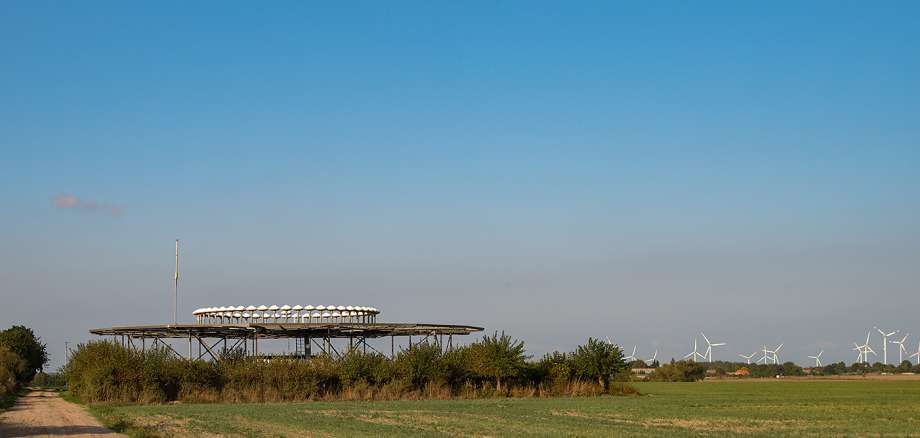DFS, the German air navigation services provider, has completed the reassessment of the protected areas around a total of 40 ground-based navigation facilities. With only one exception, all protected areas were reduced from 15 to 7 kilometres. This means that an additional area of over 21,000 square kilometres is now available to generate wind power in Germany. New satellite-based navigation methods also enable the further reduction of the number of radio beacons.
The reassessment is a joint initiative of DFS and the German Federal Ministries for Economic Affairs and Climate Protection (BMWK) and for Digital and Transport (BMDV). This initiative was based on new scientific findings. DFS and the National Metrology Institute of Germany (PTB) jointly established these findings within the framework of the WERAN research project on the interaction of wind turbines and radar/navigation funded by the BMWK. The objective was to ensure the interference-free operation of air traffic control facilities, while taking energy policy concerns into account as far as possible.
Protected area shrinks by more than three quarters
On this basis, on 1 August 2022, DFS began to reassess the protected areas of 40 Doppler very high frequency (VHF) omnidirectional radio (DVOR) beacons and to determine whether their protected area could be reduced to the radius of seven kilometres proposed by the PTB. It is only within this radius that air traffic control issues need to be taken into account in construction projects.
Only at the DVOR Kempten in the Allgäu region in the far south of Germany was the measured interference too large to reduce the protected area to seven kilometres without restriction. In this case, the PTB and DFS are currently examining what can be done in the future. DFS was able to reduce the radius for the remaining 39 DVORs. For the expansion of wind energy, however, it is not the radius that counts, but the available area. Thankfully, reducing the radius means that less than a quarter of the original area is needed as a protected area.
"The 21,000 square kilometres freed up for wind power use is the result of a focused collaboration with the PTB. We are happy to be able to make this contribution. For pilots to navigate reliably, the much smaller protected areas are still needed so that wind turbines do not deflect the signals of the navigation systems," emphasised Friedrich-Wilhelm Menge, Chief Technology Officer (CTO) on the DFS Executive Board. Thus, these protected areas are not suitable as priority areas for wind power projects and the probability of planning applications for wind turbines being rejected naturally increases within these smaller protected areas.
Satellite navigation enables dismantling of terrestrial navigation facilities
In Germany, a total of 50 ground-based omnidirectional radio beacons are currently in operation, comprising the 40 DVORs mentioned above and a further 10 conventional radio beacons (CVORs). These CVORs, which are more susceptible to interference from wind turbines, are being converted to less sensitive DVORs or dismantled entirely with the support of the German Federal Government. The only exception is the facility on the island of Helgoland.
With the introduction of modern, increasingly satellite-based navigation procedures, 20 (of 70) omnidirectional radio beacons have already been decommissioned since 2002. From 2030 onwards, only about 30 facilities will be needed. The rest will be completely dismantled.
Downloads
Media contact:
Anja Naumann
Telephone: +49 (0)421 5372 116
E-mail: presse@dfs.de
DFS Deutsche Flugsicherung GmbH, the German air navigation service provider, is a State-owned company under private law with 5,600 employees as at 31 December 2022. DFS ensures the safe and punctual flow of air traffic over Germany. Around 2,200 air traffic controllers guide more than three million flights through German airspace in peak years, up to 10,000 every day. The company operates control centres in Bremen, Karlsruhe, Langen and Munich as well as control towers at the 15 designated international airports in Germany. The subsidiary, DFS Aviation Services GmbH, markets and sells products and services related to air navigation services, and provides air traffic control at nine regional airports in Germany and at Edinburgh Airport in the United Kingdom. DFS is working on the integration of drones into air traffic and has set up a joint venture, Droniq GmbH, with Deutsche Telekom. Other subsidiaries include R. Eisenschmidt GmbH, which markets publications and products for general aviation, and Kaufbeuren ATM Training GmbH (KAT), which provides training for military air traffic services personnel. The joint venture FCS Flight Calibration Services GmbH offers flight inspection services.
